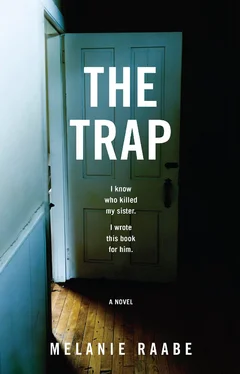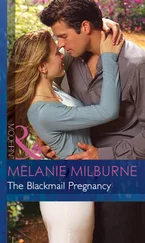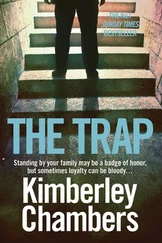It’ll all be fine, mate.
For a long time, I wondered whether to take anyone into my confidence. It would be wise. But I decided against it. What I’m planning to do is crazy. Any normal person would simply call the police. If I were to confide in Norbert, he’d tell me to do just that: Call the police, Linda!
But I can’t. If the police believed me at all, they would probably question Victor Lenzen, and then he’d be forewarned and I’d never get a look-in. I might never find out what happened all those years ago. I can’t bear that thought. No, I have to do it myself. For Anna.
There’s no other way: I must look him in the eye and ask him questions. Not polite questions, such as a policeman might put to an influential journalist who seems unimpeachable. None of your “Terribly sorry to bother you, but we have a witness here who thinks…” None of your “Where were you on the…?”
Proper questions, such as only I can ask and only if I’m alone. Besides, if I were to rope anyone else into this business, I am well aware that it would only be out of fear and selfishness. Victor Lenzen is dangerous. I don’t want him coming into contact with people I love and cherish.
So I’m left to my own devices. In the end, there isn’t anyone (not counting Norbert and Bukowski) whom I one hundred percent trust, anyway. I don’t even know if I can trust myself one hundred percent.
So I haven’t told anyone more than the bare essentials. I’ve spoken to my agent, to the head of publicity at the publishing house, and to my editor. They were all perplexed that I want to write a crime novel, and even more perplexed that I want to give an interview, but they swallowed it. I still have to talk with my publisher, but the most important things are already under way. I have a deadline for the manuscript and a publication date.
All of that is good. Having a deadline to work toward has given meaning to my existence over the years and has more than once saved my life. It’s hard living all alone in this big house, and I have often thought about simply absconding — a handful of sleeping pills, or a razor blade in the bath. .
In the end, it was always something as banal as a deadline that held me back. All that stuff was so real; I could always imagine what immense trouble I’d be causing my publishing house by failing to deliver. There were contracts and plans in place. So I carried on living and kept writing.
I try not to give too much thought to the fact that this book might be my last.
I have set a dangerous chain of events in motion by ringing up the newspaper’s editorial department. It was a clever move on my part because now there’s no turning back. It transpires that Lenzen works for a newspaper as well as in television, which is good because it would be counterproductive for him to turn up with a television crew. So I’ve arranged an interview with the newspaper — just the two of us.
I return to Jonas Weber, the young police officer with dark hair and grave eyes, one brown, one green. And to Sophie, for that’s what I’ve decided to call my literary alter ego. Sophie reminds me of the way I used to be: playful, impulsive, incapable of sitting still for long. Early-morning walks in the woods, camping trips, sex in changing rooms, mountain-climbing, football matches.
I study the portrait of Sophie on the pages I’ve written. She looks like somebody who’d like to be challenged, who isn’t yet broken. That’s not me anymore. The eyes that discovered Anna’s dead body twelve years ago are no longer mine. Bit by bit, they’ve been replaced. My lips are no longer the lips I pressed together when I watched my sister’s coffin being lowered into her grave. My hands are no longer the hands that plaited her hair before her first job interview. I am someone else. That is not a metaphor; it’s the truth.
Our body is constantly replacing cells — substituting, renewing. After seven years, we are, as it were, new. I know that kind of thing; I’ve had a hell of a lot of time to read over the years.
Now I’m sitting on a doorstep in the dark with Sophie, shivering, although it’s a warm night. The sky is clear and starry. I watch Jonas and Sophie share a cigarette and I’m sucked into my own story; I lose myself in the characters. There’s a kind of magic in sharing a cigarette with a stranger. I write and watch the two of them and almost feel the urge to take up smoking again.
The scene collapses when there’s a ring at the front door. The shock goes right through me. My heart begins to thump like mad and I can feel how thin the membrane is that separates my newly won determination from my fear. I am frozen mid-movement — my hands poised above the keys of my laptop.
I wait apprehensively for a second ring but still jump when it comes. And at the third, and at the fourth. I’m scared. I’m not expecting anyone. It’s late in the evening and I am alone with a small dog in a big house.
A few days ago I rang up the newspaper where my sister’s murderer works and inquired after him. I have drawn his attention to me. I have done something stupid and now I’m scared. The doorbell keeps on ringing, and my thoughts begin to race. What should I do? I can’t think straight. Should I ignore it? Play dead? Call the police? Creep into the kitchen and fetch a knife?
Bukowski begins to yap; he comes bounding up to me, wagging his tail — he loves visitors, after all. He streaks toward me and jumps up at me, and the angry ringing subsides for a moment. At the same time, my brain kicks back into action.
Keep calm, Linda.
There are a million explanations for why someone should ring my doorbell at half-past ten on a Thursday evening. Not one of them has anything to do with Victor Lenzen. Why would a murderer ring the doorbell? The whole thing is bound to be innocent. It’s probably only Charlotte who’s forgotten something, or my agent who lives around the corner and occasionally drops in, although rarely as late as this. Or perhaps something’s happened nearby. Maybe someone even needs help!
I am functioning again. I rouse myself out of my paralysis and hurry down the stairs to the front door. Bukowski comes with me, still yapping and wagging his tail.
I’m glad I’ve got you, mate.
I open the door. Before me stands a man.
4
SOPHIE
The air was the consistency of jelly. It had engulfed Sophie the moment she stepped out of her air-conditioned car. She hated nights like this, when the heat was so intense she couldn’t get to sleep because her skin felt sticky and she was bitten to death by mosquitoes.
She was standing at the door to her sister’s flat, ringing the bell for the second time. She’d seen light on in Britta’s flat when she’d parked the car, so she knew she was in. Britta probably wasn’t opening on principle: she objected to surprise visits, considering it plain rude to breeze in unannounced when you could at least ring from your mobile on the way.
Sophie took her finger off the bell and put her ear to the door. She could hear music inside.
“Britta?” she called. But there was no reply.
Sophie was reminded of her mother, who worried at every little thing — organizing a search party whenever either of her daughters was the least bit late, or envisaging lung cancer at the slightest cough. Sophie, on the other hand, was one of those people who believe that true misfortune only ever befalls others. So she shrugged her shoulders, rifled through her handbag for her bunch of keys that held the spare to Britta’s flat, and opened the door.
“Britta?”
It was only a few steps down the hall to the room where the music was coming from. Sophie went in and stopped, rooted suddenly to the spot. What she saw on the floor was so overwhelming that she couldn’t immediately take it in.
Читать дальше












